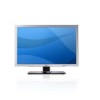Dell External USB NTSC Contents: Dell External USB NTSC/ATSC TV Tuner User's G - Page 6
Safety Instructions: Dell™ External USB NTSC/ATSC TV Tuner User - how to use atsc tv tuner
 |
View all Dell External USB NTSC manuals
Add to My Manuals
Save this manual to your list of manuals |
Page 6 highlights
Back to Contents Page Safety Instructions: Dell™ External USB NTSC/ATSC TV Tuner User's Guide Caution: Important Safety Instructions l Read Instructions - Read all the safety and operating instructions before connecting and operating your TV Tuner to help ensure your own personal safety and to protect your product from potential damage. l Retain Instructions- Retain all the safety and operating instructions for future reference. l Heed Warnings - Adhere to all warnings on the product and the operating instructions. l Grounding - For continued protection against risk of electric shock and fire, this accessory should be installed/connected only to the products, such as a computer, equipped with a three-wire grounding plug, a plug having a third (grounding) pin. This plug will only fit into a grounding-type power outlet. This is a safety feature. If you are unable to insert the plug into the outlet, contact your electrician to replace the obsolete outlet. Do not defeat the safety purpose of the grounding-type plug. l Lightning - For added protection and to prevent damage due to lightning and power-line surges, unplug the host system, such as a computer, from the wall power outlet and disconnect the antenna or cable system. Unplug the host system from the wall power outlet when left unattended or unused for long periods of time. l Never insert anything metallic into the TV Tuner openings. Doing so may create the danger of electric shock. l Openings in the TV Tuner cabinet are provided for ventilation. To prevent overheating, these openings should not be blocked or covered. Avoid using the TV Tuner on a bed, sofa, rug, or other soft surface, as doing so may block the ventilation openings in the cabinet. If you place the TV Tuner in a bookcase or an enclosed space, be sure to provide adequate ventilation and air flow. l Power Lines - An outside antenna system should not be located in the vicinity of overhead power lines or other light or power circuits, or where it can fall into such power lines or circuits. l Antenna Installation - When installing an outside antenna system, extreme care should be taken to prevent it from touching such power lines or circuits, as contact with them may be fatal. l Outdoor Antenna Grounding - If an outside antenna is connected to the product, ensure that the antenna system is grounded so as to provide some protection against voltage surges and built up static charges. Article 810.21 of the National Electric Code, ANSI/NFPA No.70, provides information with regard to proper grounding of the mast and supporting structure, grounding of the lead-in wire to the antenna discharge unit, size of grounding conductors, location of antenna-discharge unit, connection of grounding electrodes, and requirements for the grounding electrode. l Caution for users/installers in Norway - In Norway, there exists a possibility of a hazardous situation due to voltage difference between the screen of the coaxial cable of the cable distribution system and the local equipment earth (typically, earthed chassis of the PC system). To avoid any hazards, antenna/cable input connection from the TV tuner card to a Cable Distribution System must be provided through a galvanic isolator (not included). l NOTE: (for CATV System Installer) - This reminder is provided to call the CATV systems installer's attention to Section 820.93 of the National Electric Code, ANSI/NFPA 70:2005 (for US/Canada) and/or EN60728-11:2005 standard (for Europe), which provide guidelines for proper grounding and, in particular, specify that the coaxial cable shield shall be connected to the grounding system of the building, as close to the point of cable entry as practical. Example of Antenna Grounding Environmental Notices Waste Electrical and Electonic Equipment (WEEE) Directive In the Eurpoean Union, this label indicates that this product should not be disposed of with household waste. It should be deposited at an appropriate facility to enable recovery and recycling. For information on how to recycle this product responsibly in your country, please visit: www.euro.dell.com/recycling. Back to Contents Page















